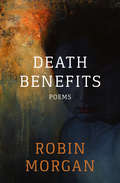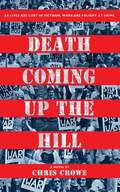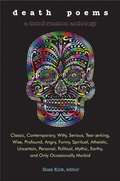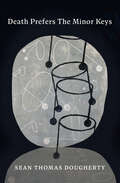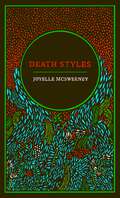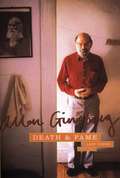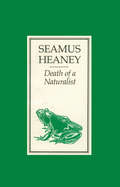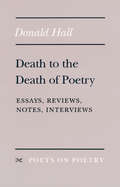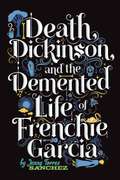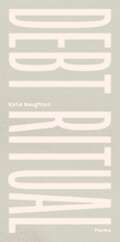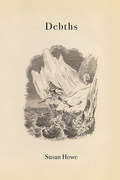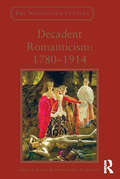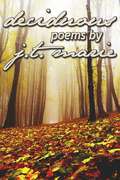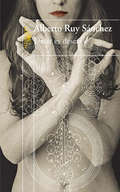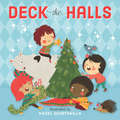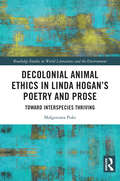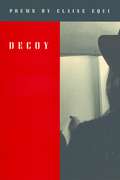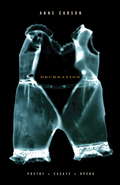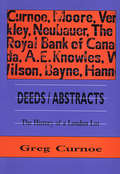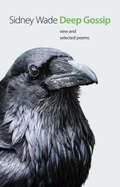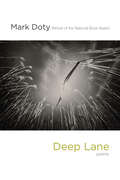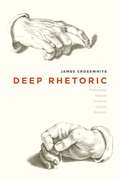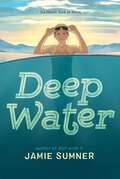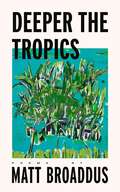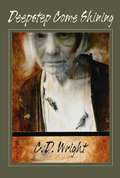- Table View
- List View
Death Benefits: Poems
by Robin MorganRobin Morgan&’s lyrical gifts are again on display in this limited edition of four of her most celebrated poems Prostituted women, pimps, Alice B. Toklas, and Bertha Mason—Edward Rochester&’s mad first wife in Jane Eyre—all make appearances in a poem titled &“Battery,&” a word that, in Morgan&’s hands, has surprising meanings. Affirmation underscores the perfect Shakespearian sonnet, &“Birthright,&” as it counsels a defiant gaze at life and death. The life of a flower and the process it undergoes to blossom is the subject of &“Peony,&” with an utterly fresh metaphor that widens to embrace the planet. And the title poem, with its witty play on words, rips through denial in all its forms to find hard but bracing truths.
Death Coming Up the Hill
by Chris CroweIt's 1968, and war is not foreign to seventeen-year-old Ashe. His dogmatic, racist father married his passionate peace-activist mother when she became pregnant with him, and ever since, the couple, like the situation in Vietnam, has been engaged in a "senseless war that could have been prevented." When his high school history teacher dares to teach the political realities of the war, Ashe grows to better understand the situation in Vietnam, his family, and the wider world around him. But when a new crisis hits his parents' marriage, Ashe finds himself trapped, with no options before him but to enter the fray.
Death Poems: Classic, Contemporary, Witty, Serious, Tear-Jerking, Wise, Profound, Angry, Funny, Spiritual, Atheistic, Uncertain, Personal, Political, Mythic, Earthy, and Only Occasionally Morbid
by Russ Kick<p>Pretty much every poet in every age has written about death and dying. Along with love, it might be the most popular subject in poetry. Yet, until now, no anthology has gathered the best and most famous of these verses in one place. <p>This collection ranges dramatically. With more than 320 poems, it goes across all of history, from the ancients straight through to today. Across countries and languages, across schools of poetry. You’ll find a plethora of approaches—witty, humorous, deadly serious, tear-jerking, wise, profound, angry, spiritual, atheistic, uncertain, highly personal, political, mythic, earthy, and only occasionally morbid. <p>Every angle you can think of is covered—the deaths of children, lost loves, funeral rites, close calls, eating meat, serial killers, the death penalty, roadkill, the Underworld, reincarnation, elegies for famous people, death as an equalizer, death as a junk man, death as a child, the death of God, the death of death . . . .</p>
Death Prefers the Minor Keys
by Sean Thomas DoughertyIn his twentieth book, most of which was first composed on the backs of medical forms while on break as a third-shift medical technician, Sean Thomas Dougherty brings us a memoir-like prose sequence reflecting on disability, chronic illness, addiction, survival, love, and parenthood. In Death Prefers the Minor Keys, Dougherty offers the reader collaged prose poems, stories and essays full of dreams, metaphors, aphorisms, parables and narratives of his work as a caregiver. Moving portraits of Dougherty’s residents, a series of letters to Death, invocations of Jewish ancestry through the photography of Roman Vishniac, imaginary treatments for brain injuries, and half translated short stories of lives both real and imagined populate this collection. Through these, Dougherty engages issues of labor, the ontology of disability, and the mysticism of life. Death Prefers the Minor Keys is most of all a kind of love letter to Dougherty’s wife, and her courage and complicity in the face of long-term illness and addiction. Ultimately, we see how the antidote to despair can reside in daily acts of caring for other human beings.
Death Styles
by Joyelle McSweeney'McSweeney is one of our most dynamic poets' Nick Ropatrazone, The Millions'I've never read anything by Joyelle McSweeney that wasn't totally exciting' Dennis CooperOne of LitHub's Most Anticipated Books for 2024In this follow-up to her award-winning collection, Toxicon and Arachne, Joyelle McSweeney proposes a link between style and survival, even in the gravest of circumstances. Setting herself the task of writing a poem a day and accepting a single icon as her starting point, however unlikely - River Phoenix, Mary Magdalene, a backyard skunk - McSweeney follows each inspiration to the point of exhaustion and makes it through each difficult day. In frank, mesmeric lyrics, Death Styles navigates the opposing forces of survival and grief, finding a way to press against death's interface, to step the wrong way out of the grave.
Death and Fame: Poems 1993-1997
by Allen GinsbergAllen Ginsberg was one of the bravest and most admired poets of this century. Famous for energizing the Beat Generation literary movement upon his historic encounter with Gregory Corso, Jack Kerouac, and William Burroughs in mid-century New York City, Ginsberg influenced several generations of writers, musicians, and poets. When he died on April 5, 1997, we lost one of the greatest figures of twentieth-century American literary and cultural history. This singular volume of final poems commemorated the anniversary of Ginsberg's death, and includes the verses he wrote in the years shortly before he died.
Death of a Naturalist
by Seamus HeaneyDeath of a Naturalist (1966) marked the auspicious debut of Seamus Heaney, a universally acclaimed master of modern literature. As a first book of poems, it is remarkable for its accurate perceptions and rich linguistic gifts.
Death to the Death of Poetry: Essays, Reviews, Notes, Interviews (Poets On Poetry)
by Donald HallDonald Hall believes that American poetry, at the present moment, thrives both in quality and in leadership. In his latest collection of essays, reviews, and interviews, Hall counters the increasingly publicized view that poetry has an ever-diminishing importance in contemporary American culture. He resents the endlessly repeated cliché that finds poetry unpopular and losing popularity. Thus: Death to the Death of Poetry. Throughout the pages of this latest offering in the Poets on Poetry series, Hall returns again and again to the theme of poetry's health, and offers essays praising contemporary poets, who serve as examples of poetry's thriving condition. In addition, Death to the Death of Poetry collects interviews in which Hall discusses the work of poetry--revisions, standards, the psychology and sociology of the poet's life. The collection will be warmly received by Donald Hall's large readership, enhanced in 1993 by publication of two exemplary volumes: The Museum of Clear Ideas, his eleventh book of poetry; and his essay Life Work, which brought him both new and returning readers. Donald Hall holds degrees from Harvard and Oxford and was recipient of the Lamont Poetry Selection Award, poetry editor for the Paris Review, and Professor of English, University of Michigan, before returning to his ancestral home in New Hampshire.
Death, Dickinson, and the Demented Life of Frenchie Garcia
by Jenny Torres SanchezTo make sense of her high school crush's suicide, Frenchie retraces her steps the last night she was with him.
Debt Ritual
by Katie NaughtonWinner of the 2023 BUNNY chapbook contest, Katie Naughton’s Debt Ritual sees debt as intensely private yet nevertheless significantly interconnected with global financial systems and other systems of power. Naughton’s text is interested in the way that what appears as money is often funded by debt, while also taking into account the role of art, something that offers social capital without the accompanying wealth. Debt Ritual sets up an equivalence between money and participation in the world and then works to destabilize it. Sized as a dollar bill, Naughton’s book considers the ritualistic use inherent in money and debt and wonders how and if the ritual of art-making replicates -- or interrupts -- the rituals of finance.
Debths
by Susan HoweThe newest collection by one of America’s most exciting poets A collection in five parts, Susan Howe’s electrifying new book opens with a preface by the poet that lays out some of Debths’ inspirations: the art of Paul Thek, the Isabella Stewart Gardner collection, and early American writings; and in it she also addresses memory’s threads and galaxies, “the rule of remoteness,” and “the luminous story surrounding all things noumenal.” Following the preface are four sections of poetry: “Titian Air Vent,” “Tom Tit Tot” (her newest collage poems), “Periscope,” and “Debths.” As always with Howe, Debths brings “a not-being-in-the-no.”
Decadent Romanticism: 1780-1914
by Kostas Boyiopoulos Mark SandyFor Decadent authors, Romanticism was a source of powerful imaginative revisionism, perversion, transition, and partial negation. But for all these strong Decadent reactions against the period, the cultural phenomenon of Decadence shared with Romanticism a mutual distrust of the philosophy of utilitarianism and the aesthetics of neo-Classicism. Reflecting on the interstices between Romantic and Decadent literature, Decadent Romanticism reassesses the diverse and creative reactions of Decadent authors to Romanticism between 1780 and 1914, while also remaining alert to the prescience of the Romantic imagination to envisage its own distorted, darker, perverted, other self. Creative pairings include William Blake and his Decadent critics, the recurring figure of the sphinx in the work of Thomas De Quincey and Decadent writers, and Percy Shelley with both Mathilde Blind and Swinburne. Not surprisingly, John Keats’s works are a particular focus, in essays that explore Keats’s literary and visual legacies and his resonance for writers who considered him an icon of art for art’s sake. Crucial to this critical reassessment are the shared obsessions of Romanticism and Decadence with subjectivity, isolation, addiction, fragmentation, representation, romance, and voyeurism, as well as a poetics of desire and anxieties over the purpose of aestheticism.
Deciduous
by J. T. MarieShort chapbook of 36 poems which capture the ephemeral quality of nature. In these pages, autumn's dying leaves crumple beneath winter's shroud of snow, and the last fleeting days of the year slip away forever.Tragic, melancholy, bittersweet ... these poems embrace and revel in the changing seasons, which mirror so closely the rhythm of the human heart.
Decir es desear
by Alberto Ruy SánchezColección de poemas de Alberto Ruy Sánchez. Por Alberto Ruy Sánchez, autor de La mano del fuego y reconocido como Oficial de la Orden de las Artes y de las Letras por el gobierno de Francia. Para celebrar la primera edición, en un mismo formato y colección, del conjunto de novelas que forman lo que ahora se conoce como El quinteto de Mogador: Los nombres del aire, En los labios del agua, Los jardines secretos de Mogador: voces de tierra, La mano del fuego y Nueve veces el asombro, y que no han dejado de ser reeditadas desde la aparición de la primera en 1987, Alfaguara ha querido compartir con sus lectores esta colección de poemas del autor.
Deck the Halls
by Running Press'Tis the season to be jolly with this new, festive board book featuring a timeless, favorite Christmas carol.Deck the halls with boughs of holly and share the joy of Christmas with your entire family in this beautiful rendition of a classic Christmas carol. Possibly part of a new series of board books for young ones to sing along with each holiday season, this book will be full of bursts of color and sweet, furry creatures that help herald in the holiday season.
Decolonial Animal Ethics in Linda Hogan’s Poetry and Prose: Towards Interspecies Thriving (Routledge Studies in World Literatures and the Environment)
by Małgorzata PoksInterspecies cosmopolitanism—understood as an effort to build a pluriversal world in which multiple forms of life can coexist—is all the more urgent in a world of already entangled biosystems, multispecies contact zones, and human/more-than-human interfaces. Critiquing the liberal discourse on animal rights for perpetuating colonial hierarchies, this volume argues that imagining a human-animal cosmopolis should be done in dialogue with traditional tribal cultures, which envision animal persons as agential beings, teachers, and relatives of the humans they have coevolved with. Steeped in North America’s Indigenous worldviews, it focuses on such questions as: who are the animals we share our earthly lives with, what can they teach us about ourselves, how can animals guide us toward more sustainable futures, and what are the conditions of possibility of human-animal thriving? This is also the first book-length study of Linda Hogan’s prose and poetry written from decolonial animal studies perspective.
Decoy
by Elaine EquiPoems by Elaine Equi "In Elaine Equi's brilliant Decoy, each poem is a 'neatly folded labyrinth.' Here everything is artifice--like the labyrinth, a deadly little joke, one we're 'in on' until, suddenly, we're not so sure. The poems in this book are both spooky and spoofy. Eventually we realize that, despite its campy, B-movie trappings, the monster (our world) is real. We realize this gradually because of Equi's light touch. Like Muhammed Ali, she floats while stinging." --Rae Armantrout "Decoy moves upon you gradually with postludes of gentleness . . . then agile maneuvers that seize us unaware. The flawless title poem, 'Decoy,' twists as if on a perilous frame, and it is. We acknowledge the dependency of poetry on the poet's sensibility. Here at each turn of her stanzas, askew or bluntly set . . . the poem feasts on dependency. 'o empiricism / o anatomy.' O poet." --Barbara Guest
Decreation: Poetry, Essays, Opera
by Anne CarsonIn her first collection in five years, Anne Carson contemplates “decreation”–an activity described by Simone Weil as “undoing the creature in us”–an undoing of self. But how can we undo self without movingthroughself, to the very inside of its definition? Where else can we start? Anne Carson’sDecreationstarts with form–the undoing of form. Form is various here: opera libretto, screenplay, poem, oratorio, essay, shot list, rapture. The undoing is tender, but tenderness can change everything, or so the author appears to believe. From the Hardcover edition.
Deeds / Abstracts: The History of a London Lot
by Greg CurnoeBefore his tragic death in 1992, Greg Curnoe had submitted to Brick Books a manuscript based on extraordinarily detailed research into the history of 38 Weston, his address in London, Ontario. The result is a journal/collage that traces the occupancy of that one small plot of land hundreds of years back into aboriginal times when land in this country was not plotted according to the laws of geometry. Deeds/Abstracts is an intensely concentrated and particular cross-section of Canadian history, layer upon layer upon layer. Brick Books is proud to offer this exemplary work-in-progress (a 500-year diary can never be complete) assembled by a much-loved and keenly-lamented Canadian artist of the first importance. Front and back covers are after paintings by Greg Curnoe. The text includes 12 colour plates of photographs and Curnoe paintings.
Deep Gossip: New and Selected Poems (Johns Hopkins: Poetry and Fiction)
by Sidney WadeA great and frequently subversive book by a lyric poet at the height of her craft.Throughout her seven critically acclaimed collections, Sidney Wade has established herself as a poet with a serious but light touch, capable of the clarity and inventiveness it takes to work a problem to both pleasure and resolution. Playing with and challenging form in all directions, the 27 new and 96 selected poems in Deep Gossip bristle with a sly wit that trips and delights the reader. Inspired by landscape, language, music, and living things, as well as the occasional bout of political outrage, Deep Gossip is a smart collection.Praise for Other Books by Sidney Wade"The quick, closely observed poems in Sidney Wade's beguiling Bird Book move from page to page like their subjects—in flight, on air, a murmuration sweeping across the horizon."—William Souder"Sidney Wade's linguistic and philosophical turns in Bird Book confirm that she is both the supreme heir to Wallace Stevens and one of the most original poets in the language."—Randall Mann"This is a beautiful, wise, and timely collection."—Daniel Anderson"As impressive and thrillingly exact as these poems are concerning matters ornithological, it is the exquisite music —'earth-sprung, bright, and resonant'—of Wade's radically short line that so enchants me, the free play of interlinear rhyme, phonemic harmonies, and small bursts of metrical rhythms that yield more vitality and delight than any gathering of poems I have encountered in a very long time."—B. H. Fairchild"Her poems [are]... a particular and splendid instance of what Hopkins meant by 'poetry proper, the language of inspiration.' "—Richard Howard
Deep Lane: Poems
by Mark Doty"Elegant, plain-spoken, and unflinching, Mark Doty's poems . . . invite us to share their ferocious compassion."--National Book Award, judges' citation for Fire to Fire Mark Doty's poetry has long been celebrated for its risk and candor, an ability to find transcendent beauty even in the mundane and grievous, an unflinching eye that--as Philip Levine says--"looks away from nothing." In the poems of Deep Lane the stakes are higher: there is more to lose than ever before, and there is more for us to gain. "Pure appetite," he writes ironically early in the collection, "I wouldn't know anything about that." And the following poem answers: Down there the little star-nosed engine of desire at work all night, secretive: in the morning a new line running across the wet grass, near the surface, like a vein. Don't you wish the road of excess led to the palace of wisdom, wouldn't that be nice? Deep Lane is a book of descents: into the earth beneath the garden, into the dark substrata of a life. But these poems seek repair, finally, through the possibilities that sustain the speaker aboveground: gardens and animals, the pleasure of seeing, the world tuned by the word. Time and again, an image of immolation and sacrifice is undercut by the fierce fortitude of nature: nature that is not just a solace but a potent antidote and cure. Ranging from agony to rapture, from great depths to hard-won heights, these are poems of grace and nobility.
Deep Rhetoric: Philosophy, Reason, Violence, Justice, Wisdom
by James Crosswhite“Rhetoric is the counterpart of logic,” claimed Aristotle. “Rhetoric is the first part of logic rightly understood,” Martin Heidegger concurred. “Rhetoric is the universal form of human communication,” opined Hans-Georg Gadamer. But in Deep Rhetoric, James Crosswhite offers a groundbreaking new conception of rhetoric, one that builds a definitive case for an understanding of the discipline as a philosophical enterprise beyond basic argumentation and is fully conversant with the advances of the New Rhetoric of Chaïm Perelman and Lucie Olbrechts-Tyteca. Chapter by chapter, Deep Rhetoric develops an understanding of rhetoric not only in its philosophical dimension but also as a means of guiding and conducting conflicts, achieving justice, and understanding the human condition. Along the way, Crosswhite restores the traditional dignity and importance of the discipline and illuminates the twentieth-century resurgence of rhetoric among philosophers, as well as the role that rhetoric can play in future discussions of ontology, epistemology, and ethics. At a time when the fields of philosophy and rhetoric have diverged, Crosswhite returns them to their common moorings and shows us an invigorating new way forward.
Deep Water
by Jamie Sumner&“Readers will feel every wave of Tully&’s emotions as she risks everything to try to get her mom&’s attention. A powerful novel in verse.&” —Lisa Fipps, author of Printz Honor book Starfish A middle grade novel in verse that &“packs a powerful punch&” (Kirkus Reviews) from acclaimed author Jamie Sumner that spans one girl&’s marathon swim over twelve miles and six hours, calling her mom back home with every stroke.Six hours. One marathon swim. That&’s all Tully Birch needs to get her life straightened out. With the help of her best friend, Arch, Tully braves the waters of Lake Tahoe to break the record for the youngest person ever to complete the famous &“Godfather swim.&” She wants to achieve something no one in the world has done, because if she does, maybe, just maybe, her mom will come back. The swim starts off well—heart steady, body loose, Arch in charge of snacks as needed. But for Tully, all that time alone with her thoughts allows memories to surface. And in the silence of deep waters, sadness can sink you. When the swim turns dangerous, Tully fights for her survival. Does she keep going and risk her own safety and Arch&’s? Or does she quit to save them both, even if it means giving up hope that her mother will return?
Deeper the Tropics
by Matt BroaddusDeeper the Tropics navigates the mythology of the self via the masked figure. These poems present the self as an accumulation of faces—or masks—over which we have only partial control. Yet it’s in this semi-public, semi-private space of self where the poems celebrate the imaginative leaps we take to find ourselves in ever-changing configurations. Operating between local and global, fantasy and history, this collection explores the self in a liminal space where simultaneities propagate.
Deepstep Come Shining
by C. D. WrightRebellious and fiercely lyrical, the poems of C.D. Wright incorporate elements of disjunction and odd juxtaposition in their exploration of unfolding context. "In my book," she writes, "poetry is a necessity of life. It is a function of poetry to locate those zones inside us that would be free, and declare them so."C.D. Wright was born and raised in the Ozark Mountains of Arkansas. She has received numerous awards for her work, including grants from the National Endowment for the Arts, the Guggenheim Foundation, the American Academy and Institute for Arts and Letters, and the Lila Wallace-Reader's Digest Foundation. She teaches at Brown University in Rhode Island."Expertly elliptical phrasings, and an uncounterfeitable, generous feel for real people, bodies and places, have lately made Wright one of America's oddest, best and most appealing poets. Her tenth book consists of a single long poem whose sentences, segments and prose-blocks weave loosely around and about, and grow out of, a road trip through the rural South. Clipped twangs, lyrical 'goblets of magnolialight,' and recurrent, mysterious, semi-allegorical figures like 'the snakeman' and 'the boneman' share space with place names, lexicographies, exhortations and wacky graffiti ('God is Louise').... cherish Wright's latest 'once-and-for-all thing, opaque and revelatory, ceaselessly burning.'"--Publishers Weekly"For me, C.D. Wright's poetry is river gold. 'Love whatever flows.' Her language is on the page half pulled out of earth and rivers--still holding onto the truth of the elements. I love her voice and pitch and the long snaky arms of her language that is willing to hold everything--human and angry and beautiful."--Michael Ondaatje"C.D. Wright is entirely her own poet, a true original."--The Gettysburg Review
